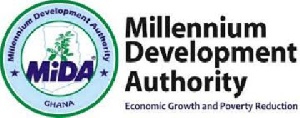 Millennium Development Authority (MiDA) logo
Millennium Development Authority (MiDA) logo
Mr Martin Eson-Benjamin, the Chief Executive Officer of the Millennium Development Authority (MiDA), has lauded the Ghana Standards Authority (GSA), for its collaboration and immense support to MiDA in the implementation of its programmes.
These include the upgrading and adoption of standards for 20 energy consuming products and appliances in Ghana.
Mr Eson-Benjamin, who made these remarks, on Wednesday, in Accra at an Awareness creation Workshop to promote the usage of efficiency standards and labels to stakeholders, said MiDA/GSA had made good progress.
He explained that work had been completed on upgrading existing standards and adopting new ones for the first group of products: refrigerators, air conditioners, ceiling fans and regulators, television sets, satellite decoders and TV signal boxes, and lighting (i.e. domestic/commercial lighting/street lighting).
Additional work, he said, would soon commence on the second group of products, namely: solar panels, solar batteries, inverters, distribution transformers, and pre-paid energy meters, next month.
He said: “It is important to educate the public about the essence and benefits of ensuring the use of high energy efficiency products, not only to us as individual households, but also to the Nation as whole.”
One of the six projects under the Ghana Compact II Programme is the Energy Efficiency and Demand-side Management (EEDSM) Project, which is aimed at promoting energy efficiency interventions in the use of power, he explained.
He noted that the interventions, including the “Development of Standards and Labels” would assist in ultimately reducing energy wastage by consumers, thereby increasing the reserve margin between electricity supply and peak demand.
It would also make electricity available to more consumers at a lower cost than that of developing new generation capacity.
“The Standards and Labelling Programme will, particularly, provide information on the performance of selected appliances and products available on the Ghanaian market, and also to help curb the use of high energy consuming appliances,” Mr Eson-Benjamin said.
“Increased public knowledge and use of energy efficiency products, through such workshops, will result in savings for households and businesses,” he added.
He said the goal of the $ 498.2 million-Ghana-Compact II programme, was to reduce poverty in Ghana through sustainable economic growth, with a focus on ensuring adequate and reliable power supply for Ghana’s development initiatives.
“For us in MiDA, it is a privilege to serve as the Accountable Entity, and we are committed to collaborating with all our Implementing Entities to deliver the Compact’s objectives,” he stated.
“The Government and high level decision and policy makers will benefit from a sense of direction and renewed impetus to drive the energy efficiency agenda,” he said.
He said the Compact Programme was funding the construction of a-state of the-Art AC Testing Facility and installing two additional testing laboratories for the GSA; declaring: “This will enable the GSA to test energy consuming appliances being imported into the country to ensure they meet minimum energy efficiency standards”.
He appealed to the implementing entities under the Compact Programme, to emulate the GSA by signing the requisite agreement for accessing the fund to accelerate Ghana’s socioeconomic development for the common good of the people.
Professor Alex Dodoo, the Director General, GSA, said the workshop related to Development and Enforcement of Standards and Labels Activities, which would develop the regulation and enforcement for the use of higher efficiency appliances, aimed at saving overall energy consumption.
He said the workshop also focused on the Education and Public Information Activity – which was expected to sensitise the public about newly developed standards.
Prof Dodoo said the GSA had already adopted, revised and gazetted more than 100 energy efficiency standards for use in trade.